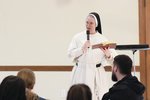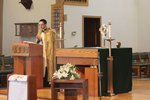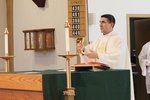




KINGSTON — On Saturday, Feb. 11, the Young Adult Eucharistic Formation Retreat was held in the church hall at Christ the King Parish.
The event was organized by the diocesan committee for Eucharistic Renewal, which hosts local level events associated with the Eucharistic Revival, a nationwide initiative started by the USCCB in July of 2022 which includes as one of its chief aims an attempt to increase devotion to the Blessed Sacrament.
The day began with a breakfast for participants, with many young adults in attendance from throughout the diocese, along with lay people, religious and priests.
The main events began at 9 a.m. with a prayer from Sister Martin de Porres, O.P., a local Dominican nun and a teacher at St. Pius V School in Providence.
“Thank you, Lord, for bringing us together. Where two or three are gathered together, you are present,” Sister Martin de Porres prayed.
“Continue our love for you in the Eucharist and give us a bigger desire to love you more and believe in you.”
The first lecture, titled “The Eucharist and Spiritual Warfare,” was delivered by Dennis Sousa, the director of the religious education office at St. Philip’s parish in Greenville.
In his lecture, Sousa situated the Catholic view on the Eucharist within the context of the battle between good and evil that defines the spiritual life.
Sousa affirmed that, contrary to the popular beliefs of many in contemporary society, the devil is not merely symbolic, nor is demonic possession a sign of emotional or psycho-social instability. Rather, the devil is a real figure. He then went through a series of Biblical and Magisterial documents that described sin or the Fall as slavery to the devil, and salvation as freedom from spiritual slavery.
Sousa said that the reality of humanity’s enslavement to the devil can be seen in the fact that modern society is “diabolically disoriented,” something that manifests itself in the fact that many people in the modern West reject the traditional Christian view on creation, the rise of radical political ideologies and the widespread acceptance of moral codes that oppose those held by the Catholic Church.
Nonetheless, Sousa went on to note that acknowledging the reality of the demonic should not lead to fear or sadness.
“There’s always reasons to remain optimistic and full of hope, actually to be excited even,” Sousa said, “because we know how the story ends: the glorious triumph of Christ over all of his enemies.”
One sign of God’s victory over the forces of sin and death can be seen in the fact that, despite a decline in formal Church membership and regular Mass attendance, God can bring about spiritual revival within the Church even from a tiny remnant of faithful.
The Eucharist serves as one of the greatest tools we have to bring about such spiritual renewal, Sousa explained, since, because of the Real Presence, the Eucharist serves as a source of protection against sin and the devil. It is for this reason that Catholic teaching on the Eucharist are one of the central, non-negotiable teachings of the Church.
“This teaching, this reality of the Real Presence, has always been the dividing line between Our Lord’s true disciples and those who aren’t,” Sousa said.
Sousa’s talk was followed by another presentation by Sister Mary Barbara Keiser, O.P., a middle school religion and history teacher at St. Pius V School in Providence. Her talk, titled “The Grace of the Eucharist,” provided an overview of the Catholic view of the Real Presence and the spiritual effects of the Eucharist.
Sister Mary Barbara began by emphasizing the supernatural or miraculous nature of the Eucharist, something which many Catholics in modern society have begun to take for granted.
She went on to explain transubstantiation, namely, when bread and wine are consecrated with the proper formula from the institutional narrative in the Sacred Liturgy, the underlying substance changes (bread and wine become the Body, Blood, Soul and Divinity of Jesus Christ), while the external qualities or accidents (the bread and wine) remain.
“It’s the only thing in nature where that’s the case, where the substance changes, but the accidents remain the same,” she noted. “That is a miracle. And we forget. We just take it for granted. It’s so part of our weekly or daily life.”
Because of the reality of transubstantiation, the spiritual effects of the Eucharist are numerous and significant, Sister Mary Barbara said, the most central of which is the deepening of our union with Christ, and, as a result of this, our union with our fellow believers. This is the reason why Eucharist-based devotions, especially Adoration, are so central to Catholic liturgical practices.
“We have to remember that just sitting in the Lord’s physical presence brings us amazing graces,” Sister Mary Barbara said.
Her talk was followed by Adoration of the Most Blessed Sacrament in the church, led by Father Philip Dufour, the assistant pastor of St. Philip’s parish in Greenville and the coordinator of the Diocesan committee for Eucharistic Renewal.
Adoration was followed by a brief lunch offered by the organizers, after which the last of the speakers, Father Christopher Murphy, the rector of Our Lady of Providence Seminary, presented a lecture titled “Receiving the Body of Christ,” focused on how the spiritual effects of the Eucharist relate to the Catholic view on suffering.
Father Murphy began by outlining the problem of evil, a reference to a series of philosophical and theological debates concerning why God would permit evil. He stated that the Catholic view on the problem of evil is that, while humans may never fully understand why God would permit evil, we can know with the certainty of faith that God can make use of suffering as a way to bring about some greater good.
“Because God is all-loving, because he is all-knowing, and because he is all-powerful, there must be some deeper significance or value or meaning to suffering that is not immediately evident,” Father Murphy explained.
He went on speak of Pope St. John Paul II’s 1984 document Salvifici Doloris, in which he stated that because God took on human flesh in the Person of Jesus, God partook in human suffering, and used it as a means of bringing about our salvation. This thus gave a redemptive quality to human suffering. As a result, one of the major themes in this document is how human suffering becomes meaningful when it is united to Christ’s suffering on the Cross.
This reality is expressed in a particularly profound manner in the Eucharist. During the celebration of Mass, Christ’s sacrifice on the Cross is renewed or re-presented, and by offering our personal sacrifices with the Sacrifice of the Mass, our struggles are also presented to the Father, he noted.
Father Murphy then offered Holy Mass to bring a close to the day’s program.
Many of those present were touched by the message of the speakers.
Cole McAssey, a parishioner of St. Philip’s and a current student at URI, was particularly moved by “the aspect of spiritual warfare and the help the Eucharist can provide, especially getting over those serious sins.”
Mary Grace, a parishioner of Immaculate Conception parish in Westerly, said that the biggest takeaway from the day’s events was how it motivated her to not take the Eucharist for granted.
“I think this talk about the Eucharist was really helpful, because sometimes I take it for granted, but I really should be taking advantage of it,” she noted.